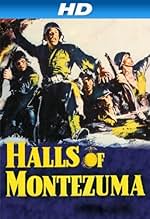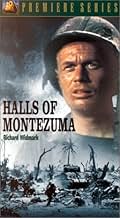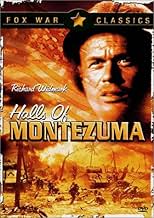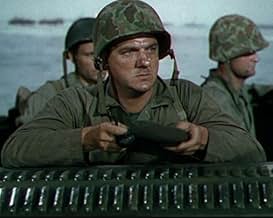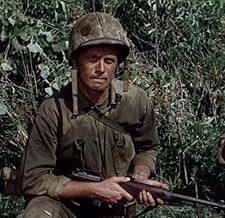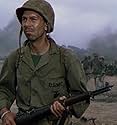IMDb RATING
6.6/10
3.1K
YOUR RATING
A company of Marines races against the clock to find a Japanese rocket base.A company of Marines races against the clock to find a Japanese rocket base.A company of Marines races against the clock to find a Japanese rocket base.
Jack Palance
- Pigeon Lane
- (as Walter {Jack} Palance)
Richard Allan
- Pvt. Stewart
- (uncredited)
Edward Binns
- First Soldier in Final Tracking Shot
- (uncredited)
Robert Board
- Marine
- (uncredited)
Robert Bohannon
- Soldier
- (uncredited)
- Director
- Writer
- All cast & crew
- Production, box office & more at IMDbPro
Featured reviews
One of the rare american war movies with a certain sense of
reality: Richard Widmark as a platoon leader conquering the
pacific island of okinawa. From the long waiting time before the
attack on the battleship, to the landing operation on the shores of
okinawa, to the painful losses of his men, we follow these serious
looking americans. Their faces seem motionless and two of the
officers, including Widmark, have psychosomatic war syndroms.
The killing is no fun in this movie, the dying is no fun to watch. All in
all, not very entertaining, but a lesson in war, much more realistic
than later US-movies on the same topic.
reality: Richard Widmark as a platoon leader conquering the
pacific island of okinawa. From the long waiting time before the
attack on the battleship, to the landing operation on the shores of
okinawa, to the painful losses of his men, we follow these serious
looking americans. Their faces seem motionless and two of the
officers, including Widmark, have psychosomatic war syndroms.
The killing is no fun in this movie, the dying is no fun to watch. All in
all, not very entertaining, but a lesson in war, much more realistic
than later US-movies on the same topic.
The interesting and uncharacteristic film is a gripping war story from Lewis Milestone in that's all patriotic and all flag-waving with valiant US soldiers facing on Japanese enemy in the Pacific Basin . The Marines assault a strongly held enemy island in the Pacific to track down a Japanese rocket base . We follow them from the beach to a Japanese rocket site throughout enemy infested jungle , being commanded Lt. Anderson , an ex-school teacher (Richard Widmark) along with his old pupil Conroy (Richard Hylton) and other Privates as Coffman (Robert Wagner) , Pretty Boy (Skip Homeier) , Whitney (Martin Milner) , Slattery (Bert Freed) ; furtermore , a Sgt. called Zelenko (Neville Brand) , Sgt. Johnson (Reginald Gardiner) , Doc (Karl Malden) and a War Correspondent named Dickerman (Jack Webb) . Along the way , all of them are transformed into battle veterans.
This thrilling , large WWII yarn capably put together by a good filmmaker , concerns a company of Marines led by a two-fisted Lieutenant whose squad becomes a tight fighting unit , while races against the clock by hunt down a Japanese rocket base . Being a fast-moving , rather thoughtful little film about battles between Marines and Japanese and their strong resistance to the invasion , though some feats are hard to believe . It is all plenty with glory-glory , propaganda and martial music in the background , being compellingly made by the same man who 21 years earlier directed the landmark anti-war film ¨All quiet on the Western Front¨. This unnerving epic depicts the war horror , including atrocities by both sides while happen attacks during the invasion . Thought-provoking screenplay , including dramatic scenes in overall effects , also has moments of astounding power with some overwhelming war images . It is competently acted by a strong cast which plus stars Richard Widmark , there are Karl Malden , Skip Homeier , Robert Wagner and Jack Palance . In addition , Richard Boone as tough Lt. Col. Gilfillan , Reginald Gardner in a rare dramatic character and Jack Webb as a war correspondent.
The motion picture was well and powerfully directed by Lewis Milestone, who cut in actual combat footage along with the mock-up set-pieces filmed in the United States at Camp Pendleton . Lewis was born in the Ukraine , but emigrated to America at 18 and he served in WWI . He often made chronicles of wartime conflicts and persisted in showing horror war from the point of view of the ordinary soldier , providing a grimmer stuff as well as quieter moments . As he showed WWI (All quiet on the western front) , WWII (A walk in the sun , Purple heart , Halls of Motzuma , Edge and darkness) and Korean war (Pork Chop Hill) ; and directed several other excellent movies in different fields , drama (Of mice and men , Strange love of Martha Ivers) , adventures (Mutiny on the Bounty) and heist-comedy (Ocean's eleven) , among others . Rating : Better than average , 7/10 . Well worth watching .
This thrilling , large WWII yarn capably put together by a good filmmaker , concerns a company of Marines led by a two-fisted Lieutenant whose squad becomes a tight fighting unit , while races against the clock by hunt down a Japanese rocket base . Being a fast-moving , rather thoughtful little film about battles between Marines and Japanese and their strong resistance to the invasion , though some feats are hard to believe . It is all plenty with glory-glory , propaganda and martial music in the background , being compellingly made by the same man who 21 years earlier directed the landmark anti-war film ¨All quiet on the Western Front¨. This unnerving epic depicts the war horror , including atrocities by both sides while happen attacks during the invasion . Thought-provoking screenplay , including dramatic scenes in overall effects , also has moments of astounding power with some overwhelming war images . It is competently acted by a strong cast which plus stars Richard Widmark , there are Karl Malden , Skip Homeier , Robert Wagner and Jack Palance . In addition , Richard Boone as tough Lt. Col. Gilfillan , Reginald Gardner in a rare dramatic character and Jack Webb as a war correspondent.
The motion picture was well and powerfully directed by Lewis Milestone, who cut in actual combat footage along with the mock-up set-pieces filmed in the United States at Camp Pendleton . Lewis was born in the Ukraine , but emigrated to America at 18 and he served in WWI . He often made chronicles of wartime conflicts and persisted in showing horror war from the point of view of the ordinary soldier , providing a grimmer stuff as well as quieter moments . As he showed WWI (All quiet on the western front) , WWII (A walk in the sun , Purple heart , Halls of Motzuma , Edge and darkness) and Korean war (Pork Chop Hill) ; and directed several other excellent movies in different fields , drama (Of mice and men , Strange love of Martha Ivers) , adventures (Mutiny on the Bounty) and heist-comedy (Ocean's eleven) , among others . Rating : Better than average , 7/10 . Well worth watching .
This is one of a slew of WW2 films made in the late 40's and early 50's, some better than others. This is definitely one of the better ones. This film features a whole bunch of future stars, such as Richard Widmark, Karl Malden, Richard Boone, Jack Palance, Robert Wagner, Jack Webb and Martin Milner. Most of them hadn't completely honed their skills yet and a couple of the performances are either a bit wooden (Malden, Wagner and Webb) or overdone (Widmark). The technology is very primitive by today's standards, yet this film holds up well. The acting aside, it seems that every effort was made to make the film as realistic as it could be. In that respect, this film is much better than some of the others of the same era. There are a lot of films from this era. If you choose to watch only a few of them, make sure this is one of the few.
I was surprised that Halls of Montezuma was not an adapted play since a great deal of the action takes place in a cave that serves as a battalion headquarters where Colonel Richard Boone is trying to extract information from prisoners.
That in itself wasn't easy because the Japanese were not known for surrendering. Boone gives an order to try and take prisoners on this landing on an unnamed Pacific island.
Richard Widmark's company finds a few of them and it's a rough go and several members of Widmark's command die in the mission. The Japanese are firing a lot of rockets from a hill and the bombing from planes doesn't do any good. Before the big push towards that hill can be made those rockets have to be dealt with.
A lot of promising young players from 20th Century Fox were in Widmark's platoon like Robert Wagner, Jack Palance, Richard Hylton, Skip Homeier, Martin Milner. Some make it and some don't. There are several flashback sequences showing these guys in their civilian lives and earlier in the war.
At the headquarters there's also quite an assortment, Jack Webb a war correspondent, Philip Ahn an articulate Japanese prisoner who is a baseball player in civilian life and looking decidedly out of place there is the urbane Reginald Gardiner replete with cigarette holder. He's along for the ride because he's an expert on Japanese culture and psychology and speaks the language.
Halls of Montezuma is a good, not a great war film. Three performances do stand out. Karl Malden as the veterinarian now serving as a medic and career marine Bert Freed and his sergeant Neville Brand.
That in itself wasn't easy because the Japanese were not known for surrendering. Boone gives an order to try and take prisoners on this landing on an unnamed Pacific island.
Richard Widmark's company finds a few of them and it's a rough go and several members of Widmark's command die in the mission. The Japanese are firing a lot of rockets from a hill and the bombing from planes doesn't do any good. Before the big push towards that hill can be made those rockets have to be dealt with.
A lot of promising young players from 20th Century Fox were in Widmark's platoon like Robert Wagner, Jack Palance, Richard Hylton, Skip Homeier, Martin Milner. Some make it and some don't. There are several flashback sequences showing these guys in their civilian lives and earlier in the war.
At the headquarters there's also quite an assortment, Jack Webb a war correspondent, Philip Ahn an articulate Japanese prisoner who is a baseball player in civilian life and looking decidedly out of place there is the urbane Reginald Gardiner replete with cigarette holder. He's along for the ride because he's an expert on Japanese culture and psychology and speaks the language.
Halls of Montezuma is a good, not a great war film. Three performances do stand out. Karl Malden as the veterinarian now serving as a medic and career marine Bert Freed and his sergeant Neville Brand.
When it was released in 1950, "Halls of Montezuma" was one of the most realistic and ambitious war movies yet made. Today its strengths still outweigh its unfortunate flaws. The flaws are an all-too-familiar sentimental streak, an absurd "revelation" about Japanese tactics, an unconvincing psycho in a clumsy explanatory flashback, and the unlikely presence, in Lt. Anderson's platoon, of a replacement who just happened to have been one of his high-school students in civilian life.
Many viewers will find such flaws even more annoying because they detract from the good things about this movie, including some solid performances (Widmark, Palance, Boone, Webb) a realistic plot, an unusually authentic look--including some (mostly) well integrated combat footage--and a spectacular scope. Until "The Longest Day" (1961), the beach landing here(with flame-throwing tanks)and the later assault on the Japanese were more impressive than any other screen depictions of a large military operation. (BTW, the failure of the Japanese to oppose the landing itself isn't a Hollywood howler; the movie accurately reflects the Japanese defense strategy on Okinawa in 1945.) Milestone's directorial masterpiece, "All Quiet on the Western Front" (1930), expresses revulsion at the slaughter of World War I. "Halls of Montezuma" affords a more complex view of men in World War II. The hero is a high-school chemistry teacher whose migraines have addicted him to painkillers; he doesn't care because he assumes he's going to be killed. One character is blinded and another killed by accident. By modern standards such incidents may seem relatively mild, but during the war such troubling images were thought to be too disturbing for film-goers. Even in 1950 they were strong stuff for a movie.
Made at a time when the Cold War was heating up dangerously in Korea, "Halls of Montezuma" is still a revealing postwar response to World War II in the Pacific.
Many viewers will find such flaws even more annoying because they detract from the good things about this movie, including some solid performances (Widmark, Palance, Boone, Webb) a realistic plot, an unusually authentic look--including some (mostly) well integrated combat footage--and a spectacular scope. Until "The Longest Day" (1961), the beach landing here(with flame-throwing tanks)and the later assault on the Japanese were more impressive than any other screen depictions of a large military operation. (BTW, the failure of the Japanese to oppose the landing itself isn't a Hollywood howler; the movie accurately reflects the Japanese defense strategy on Okinawa in 1945.) Milestone's directorial masterpiece, "All Quiet on the Western Front" (1930), expresses revulsion at the slaughter of World War I. "Halls of Montezuma" affords a more complex view of men in World War II. The hero is a high-school chemistry teacher whose migraines have addicted him to painkillers; he doesn't care because he assumes he's going to be killed. One character is blinded and another killed by accident. By modern standards such incidents may seem relatively mild, but during the war such troubling images were thought to be too disturbing for film-goers. Even in 1950 they were strong stuff for a movie.
Made at a time when the Cold War was heating up dangerously in Korea, "Halls of Montezuma" is still a revealing postwar response to World War II in the Pacific.
Did you know
- TriviaUS Marine and Navy units participated in the filming of this movie and after their work was finished, they went to fight in Korea.
- GoofsWhile speaking to his superiors on his walkie-talkie, Lt Anderson twice closes his conversation with "Over and out." This is incorrect. He should have said either "Over" (if he was turning the conversation over to the other speaker), or "Out" (if he was ending the talk). Interestingly, Anderson uses the correct term "Out" later in the film.
- Quotes
Sgt. Randolph Johnson: Wasn't there a comment by your General Sherman about war?
Lt. Butterfield: Yeah, he said, "War is Hell." What did he know, that eight-ball never left the States.
- Crazy creditsCurrent prints open with the mid 1980's 20th Century Fox logo.
- ConnectionsEdited into Tarawa, tête de pont (1958)
- SoundtracksMarines' Hymn
(uncredited)
Music from the "Gendarmes' Duet" from the opera "Geneviève de Brabant"
Written by Jacques Offenbach
Sung over the opening credits
Also played during the first landing
- How long is Halls of Montezuma?Powered by Alexa
Details
- Release date
- Country of origin
- Languages
- Also known as
- Okinawa
- Filming locations
- Marine Corps Base Camp Pendleton, California, USA(I know this, as my father was in boot camp at the time and his squad were used as extras for four days at this location, for this film.)
- Production company
- See more company credits at IMDbPro
- Runtime
- 1h 53m(113 min)
- Aspect ratio
- 1.37 : 1
Contribute to this page
Suggest an edit or add missing content


